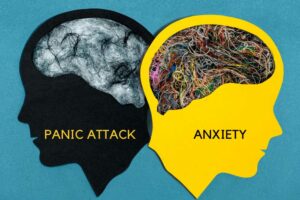Major depression is more than “the blues” or “feeling down”–much more. A short list of the symptoms includes feelings of hopelessness, helplessness, worthlessness, and emptiness; persistent sadness; decreased energy; trouble sleeping or wanting to sleep all the time; loss of interest in activities and hobbies; and a major increase or decrease in appetite.
People who have experienced major depression have described it as drowning or suffocating, of being overwhelmingly tired. Even holding your head up can feel like a major effort. It has been described as moving through fog or spiraling down into a dark hole. The worst part is that there is no end to these feelings in sight, that you might feel this bad forever. Now add to this the feeling of being addicted to a substance that you don’t even like anymore. You drink a bottle of wine to get some relief from the unbearable sadness, but you don’t like the way it tastes anymore and you hate the way you feel later. You want to quit, but you can’t. That is what struggling with the dual diagnosis of substance use disorder and clinical depression can feel like.
How Prevalent Is Dual Diagnosis?
According to the National Alliance on Mental Illness (NAMI), many people with a mental illness often have a substance use disorder at the same time. In 2018, nearly 9.2 million people in the United States were diagnosed with a mental illness and substance use disorder. An article published in Current Opinion Psychiatry stated that nearly one-third of people diagnosed with depression also have a substance use disorder (SUD). People with a dual diagnosis of depression and SUD have an increased risk of suicide, social and personal impairment, and may suffer from another psychiatric conditions as well.
Connections Between Depression and Substance Abuse
Although it is not accurate to say that one condition absolutely causes the other, there is a strong correlation between substance abuse and major depressive disorder. One condition intensifies the other–substance abuse makes the symptoms of depression worse and depression makes the symptoms of substance abuse more difficult to manage. People suffering from depression frequently self-medicate with drugs or alcohol. Although doing so can alleviate symptoms in the moment, in the long-run, self-medicating usually worsens symptoms of depression. There are some suggestions that substance abuse can cause new symptoms of depression. In addition, drugs or alcohol interact with antidepressants and may make them less effective.
Hope and Treatment
Although living with both an addiction and clinical depression can feel overwhelming, the good news is that both conditions can be treated. Help–and hope–is available.
It is imperative that both conditions be treated using an integrated approach. In years past, treatment for drug and alcohol addiction only focused on having the patient achieve sobriety and commit to a substance-free lifestyle. If a patient was sober but still suffering from depression, they were very vulnerable to relapse. When the next bout of depression hit, it was almost impossible for the patient to remain sober. Many facilities now offer treatment for both disorders, recognizing that the depression needs to be addressed if the patient is to achieve sobriety. In looking for a treatment center, look for one that is licensed to treat both disorders, that involves you in setting goals for your treatment, that provides education about both disorders, and that teaches life skills to manage both.
Self-Help Measures
If you are experiencing major depression and struggling with an addiction, it is very important that you seek help from an experienced mental health professional or a substance abuse rehabilitation center that treats both. There are, however, measures that you can take on your own that will help to make your symptoms more manageable.
Work to manage your stress. Meditation and deep breathing techniques can help to reduce stress. Learn to cope with uncomfortable feelings. As bad as the feelings that occur when you are depressed and struggling with an addiction, know that feelings are just that–feelings. They won’t last forever. Sit with them. Observe them. Also, know the triggers that make you want to drink or use drugs and develop strategies to cope with these triggers without using/drinking.
Spend time with other people. When you are depressed it is very difficult to muster up the energy to go out and be with people, but it will make you feel better. If you are seeing a therapist make sure you keep your appointments, and if you are part of a support group, keep attending meetings.
Maintain a healthy lifestyle. Getting 30 minutes of aerobic exercise several days a week will help improve your mood. Using relaxation techniques will help you to manage stress and be sure that you are eating a healthy diet and getting seven to nine hours of sleep a night.
Find meaning in life. It may sound trite, but if you have a reason to get up in the morning you will feel better. Find activities and interests that you enjoy and give you a sense of purpose.
If you combine these self-care measures with professional treatment, you will be able to weather the storm of depression and embrace a sober lifestyle.
At Promising Outlook, we understand that substance abuse frequently begins as a way for a person to cope with the painful emotions brought about by an underlying issue. Many people who struggle with substance use disorder have other mental health issues as well, including clinical depression. Addressing the underlying mental health issues is a vital part of recovering from addiction. Promising Outlook offers a comprehensive recovery program rooted in the 12-Step tradition designed to treat the whole person. An individualized treatment plan is developed for each patient and could include cognitive behavioral therapy (CBT), dialectical behavioral therapy (DBT), mindfulness-based stress reduction, relapse prevention (RP), motivational interviewing, and psychotherapy. We also offer education in anger management. Outpatient programs are offered to men and women ages 18 and up. If you or someone you know is struggling with an addiction and seeking treatment in a compassionate, nonjudgmental environment, call us at 866.980.2869.






